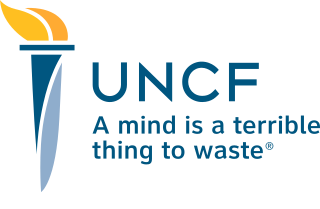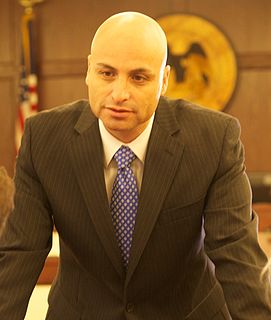Related Research Articles

UNCF, the United Negro College Fund, also known as the United Fund, is an American philanthropic organization that funds scholarships for black students and general scholarship funds for 37 private historically black colleges and universities. UNCF was incorporated on April 25, 1944, by Frederick D. Patterson, Mary McLeod Bethune, and others. UNCF is headquartered at 1805 7th Street, NW in Washington, D.C. In 2005, UNCF supported approximately 65,000 students at over 900 colleges and universities with approximately $113 million in grants and scholarships. About 60% of these students are the first in their families to attend college, and 62% have annual family incomes of less than $25,000. UNCF also administers over 450 named scholarships.

A scholarship is a form of financial aid awarded to students to further their education. Scholarships are awarded based upon various criteria, such as academic merit, diversity and inclusion, athletic skill, and financial need. Scholarship criteria usually reflect the values and goals of the donor or founder of the award. While scholarship recipients are not required to repay scholarships, the awards may require that the recipient continue to meet certain requirements during their period of support, such maintaining a minimum grade point average or engaging in a certain activity. Scholarships may provide a monetary award, an in-kind award, or a combination.

Wilberforce University is a private historically black university in Wilberforce, Ohio. Affiliated with the African Methodist Episcopal Church (AME), it was the first college to be owned and operated by African Americans. It participates in the United Negro College Fund.

SLM Corporation is a publicly traded U.S. corporation that provides consumer banking. Its nature has changed dramatically since it was set up in 1973. At first, it was a government entity that serviced federal education loans. It then became private and started offering private student loans, although at one point it had a contract to service federal loans.

Howard University is a private federally chartered historically black research university in Washington, D.C., US. It is classified among "R2: Doctoral Universities – High research activity" and accredited by the Middle States Commission on Higher Education.

Upward Bound is a federally funded educational program within the United States. The program is one of a cluster of programs now referred to as TRiO, all of which owe their existence to the federal Economic Opportunity Act of 1964 and the Higher Education Act of 1965. Upward Bound programs are implemented and monitored by the United States Department of Education. The goal of Upward Bound is to provide certain categories of high school students better opportunities for attending college. The categories of greatest concern are those with low income, those with parents who did not attend college, and those living in rural areas. The program works through individual grants, each of which covers a restricted geographic area and provides services to approximately 59,000 students annually. The program focuses on academic and nonacademic resources and activities like visits to museums or tutoring for school work. Students are encouraged to be involved in Upward Bound for the entire academic year and a 6-week long summer program. Many students who are also granted access into the Upward Bound program are labeled as first generation college students, who are students that are the first in their family to attend college. This program is set in place for students who come from low income families as well as underrepresented schools and gives them an opportunity to excel in college.
The National Hispanic University (NHU) was a small, private university located in San Jose, California, founded by Stanford-educated Dr. B. Roberto Cruz. National Hispanic University ceased operations on August 23, 2015. It was the first four-year Latino university in the United States. NHU's vision was to foster "a caring learning environment where students have felt valued and supported at every step in their academic journey. Embracing diversity and multiple perspectives as guiding principles."
The Society of Hispanic Professional Engineers (SHPE) was founded in Los Angeles, California in 1974 by a group of engineers employed by the city of Los Angeles. Their objective was to form a national organization of professional engineers to serve as role models in the Latino community.

Mary Jane McLeod Bethune was an American educator, philanthropist, humanitarian, womanist, and civil rights activist. Bethune founded the National Council of Negro Women in 1935, established the organization's flagship journal Aframerican Women's Journal, and resided as president or leader for myriad African American women's organizations including the National Association for Colored Women and the National Youth Administration's Negro Division. She also was appointed as a national adviser to president Franklin D. Roosevelt, whom she worked with to create the Federal Council on colored Affairs, also known as the Black Cabinet. She is well known for starting a private school for African-American students in Daytona Beach, Florida. It later continued to develop as Bethune-Cookman University. Bethune was the sole African American woman officially a part of the US delegation that created the United Nations charter, and she held a leadership position for the American Women's Voluntary Services founded by Alice Throckmorton McLean. For her lifetime of activism, she was deemed "acknowledged First Lady of Negro America" by Ebony magazine in July 1949 and was known by the Black Press as the "Female Booker T. Washington". She was known as "The First Lady of The Struggle" because of her commitment to gain better lives for African Americans.

The National Hispanic Institute (NHI) is an international nonprofit organization dedicated to serving the future leadership needs of the global Hispanic community. Founded in 1979 in the State of Texas with the mission of serving the future leadership needs of the United States via the Hispanic/Latino community, NHI became the largest Latino youth organization in the United States. NHI is now an international organization with over 85,000 alumni worldwide and a well-known consortium of notable colleges and universities.
The Thurgood Marshall College Fund (TMCF) is an American non-profit organization that supports and represents nearly 300,000 students attending its 47 member-schools that include public historically black colleges and universities (HBCUs), medical schools, and law schools. The organization is named after the Supreme Court's first African-American Justice, Thurgood Marshall.

A Hispanic-serving institution (HSI) is defined in federal law as an accredited, degree-granting, public or private nonprofit institution of higher education with 25% or more total undergraduate Hispanic or Latino full-time equivalent (FTE) student enrollment. In the 2018–19 academic year, 539 institutions met the federal enrollment criterion.
Sara Martinez Tucker is a former chief executive officer of the National Math and Science Initiative. She was formerly the under secretary of education at the U.S. Department of Education and a former president and chief executive officer of the Hispanic Scholarship Fund (HSF). She is a member on the following boards of directors: American Electric Power, Xerox, Sprint, and the Council for Aid to Education. She also serves on the University of Notre Dame's board of trustees.

The White House Initiative on Educational Excellence for Hispanics is a multi-agency working group within the Department of Education charged with strengthening the nation's capacity to provide high-quality education while increasing opportunities for Hispanic American participation in federal education programs. In addition, the Initiative serves as a resource for information related to closing the educational achievement gap for Hispanic Americans. Finally, the Initiative provides staffing to support and coordinate the mission of a President's Advisory Commission on Educational Excellence for Hispanics.
The D.C. Opportunity Scholarship Program provides scholarships to low-income children in Washington D.C. for tuition and other fees at participating private schools. The program was the first Federally funded school voucher program in the United States. It was first approved in 2003 and allowed to expire for the first time in 2009 under the Obama administration. The program was reauthorized under the SOAR Act in 2011, but again defunded at the end of the second Obama presidency. The program was reinstated under President Trump.

Hector Hugo Balderas Jr. is an American lawyer and former prosecutor who has been the attorney general of New Mexico since 2015. In 2006, Balderas became the youngest statewide Hispanic elected official in the nation when he won his first race for New Mexico state auditor at the age of 33. Before that Balderas served as a State Representative in the New Mexico Legislature from 2004 to 2006. Balderas also serves as the elected treasurer of the National Association of Latino Elected Officials.
Undocumented youth in the United States are young people living in the United States without U.S. citizenship or other legal immigration status. An estimated 1.1 million undocumented minors resided in the U.S. as of 2010, making up 16% of the undocumented population of 11 million. Undocumented students face unique legal uncertainties and limitations within the United States educational system. They are sometimes called the 1.5 generation, as they have spent a majority of their lives in the United States.
The Gates Millennium Scholars (GMS) Program is an academic scholarship award and program for higher education, available to high-achieving ethnic minority students in the United States. It was established in 1999 and funded by Microsoft founder Bill Gates through the Bill & Melinda Gates Foundation. Gates Millennium Scholars are provided with a full financial scholarship to attend any U.S. college or university, and are provided with leadership development opportunities, mentoring, as well as academic, financial and social support.

Henry R. Muñoz III is an American activist. He has launched national movements including Momento Latino, TheDream.US and Latino Victory to support the Latino community through awareness, college funding and electoral support.
The Hispanic Federation (HF) is a U.S based non-governmental organization focused on supporting Hispanic communities through local, state, and national advocacy. The Federation was founded in New York City in 1990 by a small group of Latino leaders, establishing initiatives to advocate for the interests of the Hispanic community and has expanded to establish programs, and policies in 16 states. The organization's objective is to empower and advance the Hispanic community primarily through service pillars, membership services, advocacy, and community programs. The Federation has formed relationships with a network of 100 Latino grassroots nonprofits, as well as collaborating with organizations, government officials, and private sector partners to enact systemic change related to a variety of socioeconomic issues for Hispanic communities. The Federation has gained national recognition for its work in areas of education, health, immigration, economic empowerment, civic engagement, environment, and organizational development to strengthening Latino institutions to ultimately increase the quality of life within Hispanic communities.
References
- ↑ Rosales, F. Arturo (2006). Dictionary of Latino Civil Rights History . Arte Público Press. p. 213. ISBN 1611920396 . Retrieved June 15, 2015.
Hispanic College Fund.
- ↑ "Hispanic College Fund Makes Students' Dreams Their Realities". 25 (2). Hispanic Engineer & IT. Autumn 2010: 6. Retrieved 15 June 2015.
{{cite journal}}: Cite journal requires|journal=(help) - ↑ "UWM leader resigns for post in Washington". jsonline.com. August 16, 2010. Retrieved June 15, 2015.
- ↑ "The J. Willard and Alice S. Marriott Foundation has promised up to $500,000 annually to the Hispanic college fund and the United Negro College fund". Diverse Issues in Higher Education. May 31, 2007. Archived from the original on September 24, 2015. Retrieved June 15, 2015.
- ↑ "Verizon Awards Hispanic College Fund $180,000 to Help Prepare Latino Youth for 21st Century Workforce". Education Letter. November 2, 2011. Archived from the original on September 24, 2015. Retrieved June 15, 2015.
- ↑ "12 Scholarships for Hispanic Students Interested in STEM". usnews.com. December 15, 2011. Retrieved June 15, 2015.